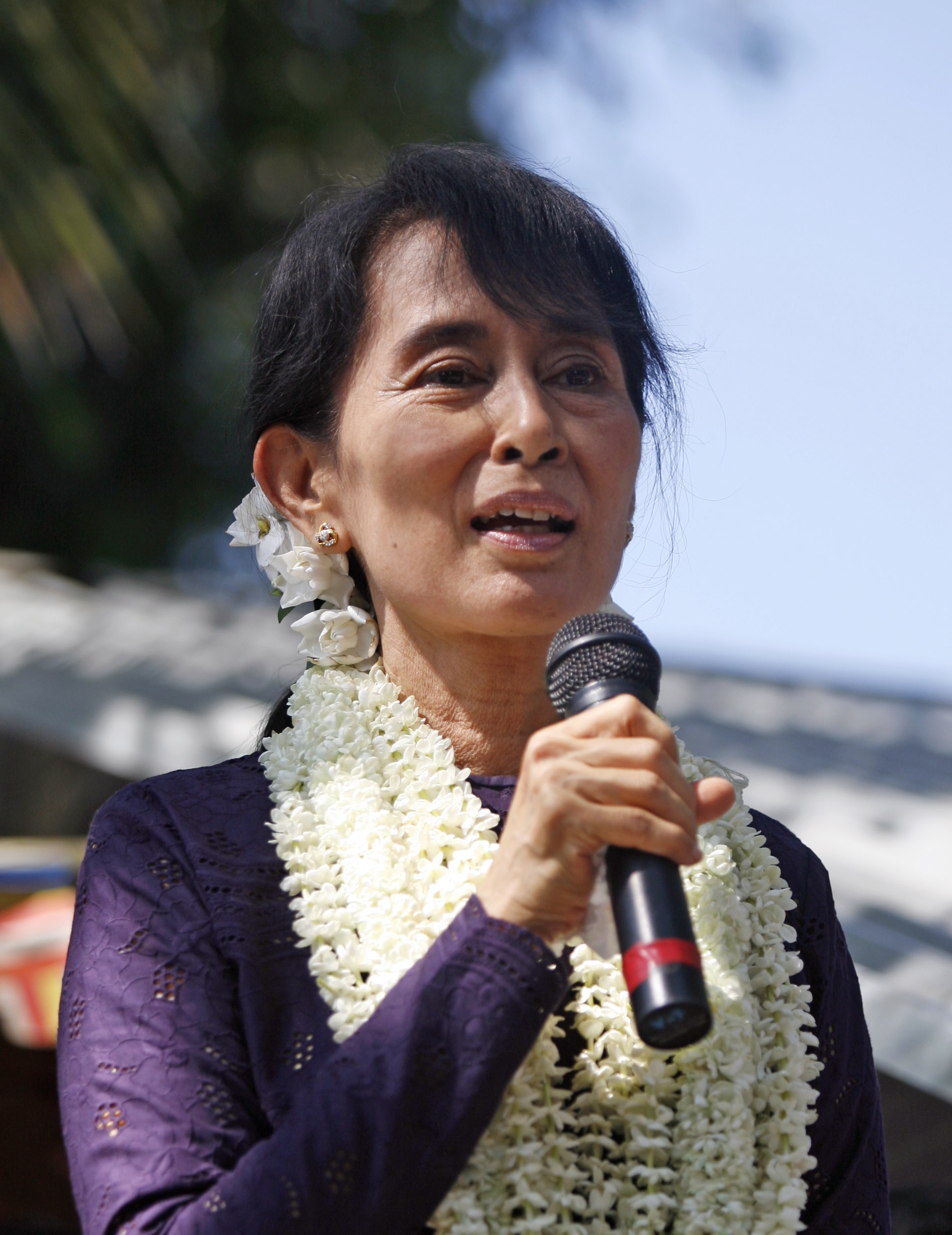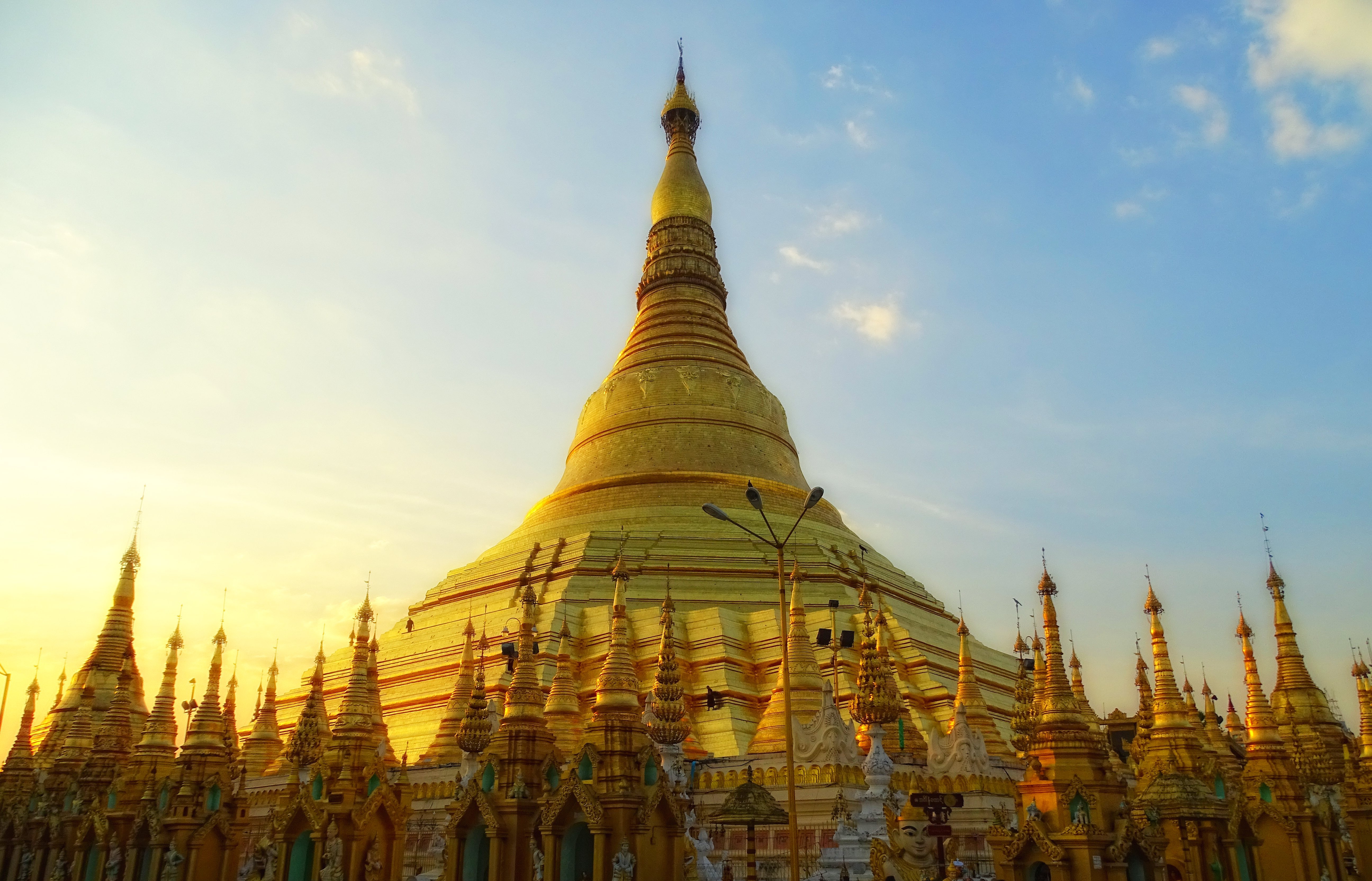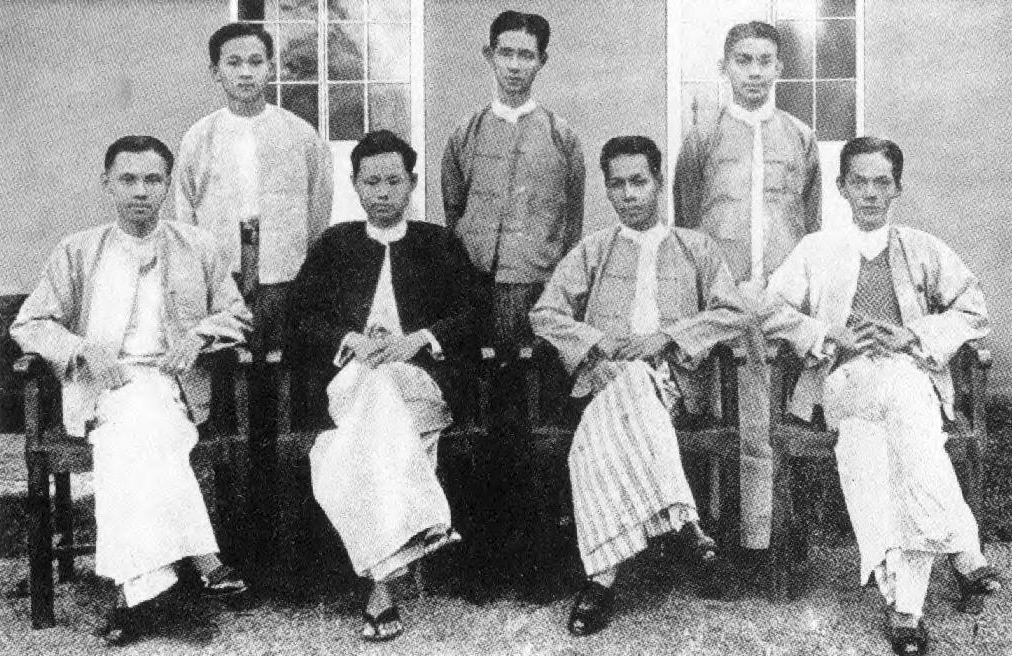|
Min Ko Naing
Paw Oo Tun ( my, ပေါ်ဦးထွန်း ); better known by his alias Min Ko Naing, ( , lit. "conqueror of kings") is a leading democracy activist and dissident from Myanmar. He has spent most of the years since 1988 imprisoned by the state for his opposition activities. ''The New York Times'' has described him as Burma's "most influential opposition figure after Daw Aung San Suu Kyi". Early life/student years Min Ko Naing was born in Yangon, the third son of Thet Nyunt and Hla Kyi, a couple from Mudon Township, Mudon in Mon State. He has three sisters: Kyi Kyi Nyunt, Ye Ye Nyunt, and Thadar Nyunt. His parents are of ethnic Mon people but Min Ko Naing has only a smattering of Mon language. He has remained involved in the Yangon's Mon community, serving a speaker on the annual Mon National Day. Min Ko Naing began his undergrad study at the Yangon University, Rangoon Arts and Science University in the mid-1980s where he majored in Zoology. During his student years, he wa ... [...More Info...] [...Related Items...] OR: [Wikipedia] [Google] [Baidu] |
Yangon
Yangon ( my, ရန်ကုန်; ; ), formerly spelled as Rangoon, is the capital of the Yangon Region and the largest city of Myanmar (also known as Burma). Yangon served as the capital of Myanmar until 2006, when the military government relocated the administrative functions to the purpose-built capital city of Naypyidaw in north central Myanmar. With over 7 million people, Yangon is Myanmar's most populous city and its most important commercial centre. Yangon boasts the largest number of colonial-era buildings in Southeast Asia, and has a unique colonial-era urban core that is remarkably intact. The colonial-era commercial core is centered around the Sule Pagoda, which is reputed to be over 2,000 years old. The city is also home to the gilded Shwedagon Pagoda – Myanmar's most sacred and famous Buddhist pagoda. Yangon suffers from deeply inadequate infrastructure, especially compared to other major cities in Southeast Asia, such as Jakarta, Bangkok or Hanoi. Though ... [...More Info...] [...Related Items...] OR: [Wikipedia] [Google] [Baidu] |
Mon National Day
Mon National Day ( mnw, တ္ၚဲကောန်ဂကူမန်, rungmoam kaun kay kaw mon; my, မွန်အမျိုးသားနေ့; th, วันชาติมอญ) is an annual national day that commemorates the founding of Hanthawaddy kingdom. Mon National Day is celebrated by the Mon people in Myanmar and Thailand, and by overseas Mon communities. The day is held on the first waning day of the lunar month of Tabodwe (''Maik'' in Mon) in the Burmese calendar, following Māgha Pūjā. Origins Mon National Day was first celebrated in 1947, marking the mythic foundation of last Mon kingdom, Hanthawaddy (now centred in Bago), in CE 573. The origins of Mon National Day parallel that of Karen New Year, as both were colonial-era celebrations that fostered the ethnic identity of these communities. The former was established by the United Mon Association via resolution, in October 1947 in the village of Kamawuk in Mudon Township. In 1974, the Burma Sociali ... [...More Info...] [...Related Items...] OR: [Wikipedia] [Google] [Baidu] |
Amnesty
Amnesty (from the Ancient Greek ἀμνηστία, ''amnestia'', "forgetfulness, passing over") is defined as "A pardon extended by the government to a group or class of people, usually for a political offense; the act of a sovereign power officially forgiving certain classes of people who are subject to trial but have not yet been convicted." Though the term general pardon has a similar definition, an amnesty constitutes more than a pardon, in so much as it obliterates all legal remembrance of the offense. Amnesty is increasingly used to express the idea of "freedom" and to refer to when prisoners can go free. Amnesties, which in the United Kingdom may be granted by the crown or by an act of Parliament, were formerly usual on coronations and similar occasions, but are chiefly exercised towards associations of political criminals, and are sometimes granted absolutely, though more frequently there are certain specified exceptions. Thus, in the case of the earliest recorded amnesty, ... [...More Info...] [...Related Items...] OR: [Wikipedia] [Google] [Baidu] |
State Law And Order Restoration Council
State may refer to: Arts, entertainment, and media Literature * ''State Magazine'', a monthly magazine published by the U.S. Department of State * ''The State'' (newspaper), a daily newspaper in Columbia, South Carolina, United States * ''Our State'', a monthly magazine published in North Carolina and formerly called ''The State'' * The State (Larry Niven), a fictional future government in three novels by Larry Niven Music Groups and labels * States Records, an American record label * The State (band), Australian band previously known as the Cutters Albums * ''State'' (album), a 2013 album by Todd Rundgren * ''States'' (album), a 2013 album by the Paper Kites * ''States'', a 1991 album by Klinik * ''The State'' (album), a 1999 album by Nickelback Television * ''The State'' (American TV series), 1993 * ''The State'' (British TV series), 2017 Other * The State (comedy troupe), an American comedy troupe Law and politics * State (polity), a centralized political organizatio ... [...More Info...] [...Related Items...] OR: [Wikipedia] [Google] [Baidu] |
1990 Burmese General Election
General elections were held in Myanmar on 27 May 1990, the first multi-party elections since 1960, after which the country had been ruled by a military dictatorship. The elections were for a parliament-sized constitutional committee to draft a new constitution. The result was a landslide victory for Aung San Suu Kyi's National League for Democracy (NLD), which won 392 of the 492 seats. However, the military junta refused to recognise the results and continued ruling the country until 2011. Voter turnout was 72.6%. Background The aftermath of the uprising in 1988 and the rise of leader Aung San Suu Kyi placed worldwide media attention on the political situation in Myanmar. In September 1988, the State Law and Order Restoration Council (SLORC, the predecessor to the State Peace and Development Council), in its Declaration No. 1, had set four goals for the country: to maintain law and order, improve transportation, improve the humanitarian situation and hold multi-party electi ... [...More Info...] [...Related Items...] OR: [Wikipedia] [Google] [Baidu] |
Shwedagon Pagoda
The Shwedagon Pagoda (, ); mnw, ကျာ်ဒဂုၚ်; officially named ''Shwedagon Zedi Daw'' ( my, ရွှေတိဂုံစေတီတော်, , ) and also known as the Great Dagon Pagoda and the Golden Pagoda is a gilded stupa located in Yangon, Myanmar. The Shwedagon is the most sacred Buddhist pagoda in Myanmar, as it is believed to contain relics of the four previous Buddhas of the present kalpa. These relics include the staff of Kakusandha, the water filter of Koṇāgamana, a piece of the robe of Kassapa, and eight strands of hair from the head of Gautama. Built on the high Singuttara Hill, the tall pagoda stands above sea level,The pagoda's pinnacle height (to the tip of its ''hti'') is tall per (UNESCO 2018), and is built on the Singuttara Hill, which is tall per , and tall above sea level per and dominates the Yangon skyline. Yangon's zoning regulations, which cap the maximum height of buildings to above sea level (75% of the pagoda's sea ... [...More Info...] [...Related Items...] OR: [Wikipedia] [Google] [Baidu] |
Aung San
Aung San (, ; 13 February 191519 July 1947) was a Burmese politician, independence activist and revolutionary. He was instrumental in Myanmar's struggle for independence from British rule, but he was assassinated just six months before his goal was realized. Aung San is considered the founder of modern-day Myanmar and the Tatmadaw (the country's armed forces), and is commonly referred to by the titles "Father of the Nation", "Father of Independence", and "Father of the Tatmadaw". Devoted to ending British Colonial rule in Burma, Aung San founded or was closely associated with many Burmese political groups and movements and explored various schools of political thought throughout his life. He was a life-long anti-imperialist and studied socialism as a student. In his first year of university he was elected to the executive committee of the Rangoon University Students' Union and served as the editor of its newspaper. He joined the Thakin Society in 1938 and served as its gener ... [...More Info...] [...Related Items...] OR: [Wikipedia] [Google] [Baidu] |
British Rule In Burma
( Burmese) , conventional_long_name = Colony of Burma , common_name = Burma , era = Colonial era , event_start = First Anglo-Burmese War , year_start = 1824 , date_start = 5 March , event_end = Independence declared , year_end = 1948 , date_end = 4 January , life_span = 1824–1948 , event1 = Anglo-Burmese Wars , date_event1 = 1824–1826, 1852–1853, 1885 , event2 = Separation from British India , date_event2 = 1937 ( Government of Burma Act) , event3 = Japanese and Thai occupation , date_event3 = 1942–1945 , p1 = British Raj , flag_p1 = British_Raj_Red_Ensign.svg , p2 = Konbaung Dynasty , flag_p2 = Flag of Konbaung Dynasty (Nonrectangular).svg , p3 = State of Burma , ... [...More Info...] [...Related Items...] OR: [Wikipedia] [Google] [Baidu] |
Phone Maw
The 8888 Uprising ( my, ၈၈၈၈ အရေးအခင်း), also known as the People Power UprisingYawnghwe (1995), pp. 170 and the 1988 Uprising, was a series of nationwide protests, marches, and riots in Burma (present-day Myanmar) that peaked in August 1988. Key events occurred on 8 August 1988 and therefore it is commonly known as the "8888 Uprising". The protests began as a student movement and were organised largely by university students at the Rangoon Arts and Sciences University and the Rangoon Institute of Technology (RIT). Since 1962, the Burma Socialist Programme Party had ruled the country as a totalitarian one-party state, headed by General Ne Win. Under the government agenda, called the Burmese Way to Socialism, which involved economic isolation and the strengthening of the military, Burma became one of the world's most impoverished countries.Burma Watcher (1989)Woodsome, Kate. (7 October 2007)'Burmese Way to Socialism' Drives Country into Poverty Voic ... [...More Info...] [...Related Items...] OR: [Wikipedia] [Google] [Baidu] |
Kyat
The kyat (, or ; my, ကျပ် ; ISO 4217 code MMK) is the currency of Myanmar (Burma). The typical notation for the kyat is "K" (singular) and "Ks." (plural), placed before the numerals followed by " /-" The term ''kyat'' derives from the ancient Burmese unit ''kyattha'' ( my, ကျပ်သား), equal to 16.3 (16.329324593) grams of silver. Current MMK exchange rates From 2001 to 2012, the official exchange rate varied between Ks. 5/75 and Ks. 6/70 per US dollar (Ks. 8/20 to Ks. 7/- per euro). However, the street rate (black market rate), which more accurately took into account the standing of the national economy, has varied from Ks.750/- to Ks.1,335/- per USD (Ks.985/- to Ks.1,475/- per EUR). The black market exchange rates (USD to MMK) decrease during the peak of the tourist season in Burma (December to January). On 2 April 2012, the Central Bank of Myanmar announced that the value of the kyat against the US dollar would float, setting an ini ... [...More Info...] [...Related Items...] OR: [Wikipedia] [Google] [Baidu] |
Students' Union
A students' union, also known by many other names, is a student organization present in many colleges, universities, and high schools. In higher education, the students' union is often accorded its own building on the campus, dedicated to social, organizational activities, representation, and academic support of the membership. In the United States, ''student union'' often only refers to a physical building owned by the university with the purpose of providing services for students without a governing body. This building is also referred to as a student activity center, although the Association of College Unions International (largely US-based) has hundreds of campus organizational members. Outside the US, ''student union'' and ''students' union'' more often refer to a representative body, as distinct from a ''student activity centre'' building. Purpose Depending on the country, the purpose, assembly, method, and implementation of the group might vary. Universally, the purpose of ... [...More Info...] [...Related Items...] OR: [Wikipedia] [Google] [Baidu] |






